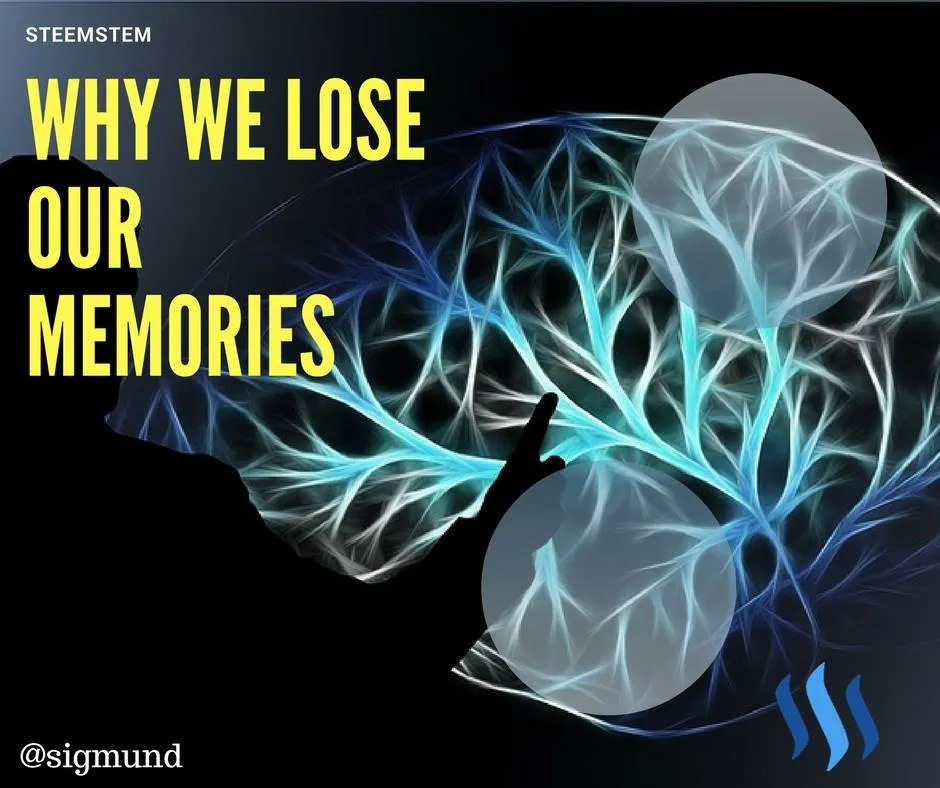
Scenario 1:
You are walking on the street and someone stops you. You turn to look at the person and you discover its an old time friend. In your excitement you try to scream the person's name but you pause cos even though the person's name is at the tip of your tongue, you just can't remember it. Frustration ensues.
Scenario 2:
You are 75 years old and you start to think pants are helmets given to ex soldiers. So you parade yourself in your neighborhood as a pant wearing soldier on a mission to save the world.
Whatever the case maybe, the loss of memory or our inability to remember things as at the time they are most needed can be one of the scariest thing to happen to humans as we age and grow old;
But in other to understand why we lose memories or forget things.., lets first take a look at how we gather memories and keep them.
HOW DOES THE BRAIN KEEP AND SAVE MEMORIES
The brain contains billions of nerve cells arranged in a way that our thoughts, emotion, behavior, movement and sensation are highly coordinated for full efficiency and effectiveness. On the other hand, Memory is the faculty of the mind by which information is stored, encoded and retrieved.
In other to understand how our brain saves memories, let us talk about the types of memories based on how long they are held in the brain.
SENSORY MEMORIES: It’s the shortest term element of memory, it is the ability to retain impressions of sensory information after the original stimuli have ended usually with the aid of our five senses. These information are retained accurately but very briefly. Its why you can still remember little details of a picture when it is flashed in front of you.
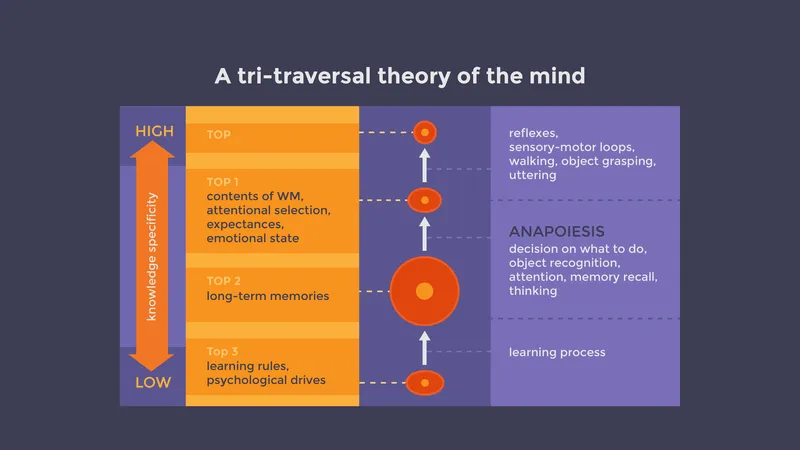
Wikimedia Commons: Theory of the mind
SHORT TERM MEMORIES: Think of short term memory as note drafts, where you hold information temporarily to either be stored permanently or be completely erased. Short term memory is why interpreters can interpret something they heard moments ago, its why you can remember the last sentence before this one, its why you can wait for someone to state an argument then counter a point they made minutes ago. Its why you can still remember something you lecturer said even after the class must have ended.
LONG TERM MEMORIES: Its for storage of information over a long period of time. Short term memory can become long term memory through a process knowns as consolidation; Consolidation to put it very simple is rehearsing a memory till it becomes long term. Its the continuous usage of a memory till it becomes a part of you.

Wikipedia: The Line Processes to Make Information Memory
Each of this stages act as a sort of filter, saving us from the madness of having to store all the information and memories we experience as humans.
When we experience something say like running from danger or learning a new language, the experience is converted into a pulse of electric energy that travels across a networks of neurons. Experiences or events as they happen to us first land in short term memory.
Depending on how important that information is important to us or how well it was able to leave an impression on our brain(consolidation), it is either soon discarded or transferred to another part of the brain responsible for long term memory through areas such as the hippocampus and finally to millions of storage regions across the brain.
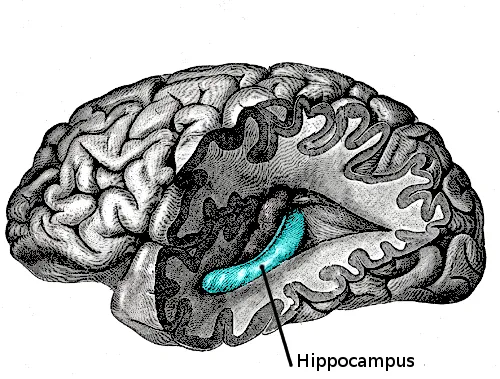
Wikipedia: Posterior and inferior cornua of left lateral ventricle exposed from the side
These neurons responsible for sending and encoding information and experiences communicate and interact with each other at dedicated points called synapses using specialized neuro-transmitters;
If two neurons continue to communicate regularly the efficiency of communication between them increases.
This process is called Long term potentiation and it’s the reason why memories are stored long term and some ain't.
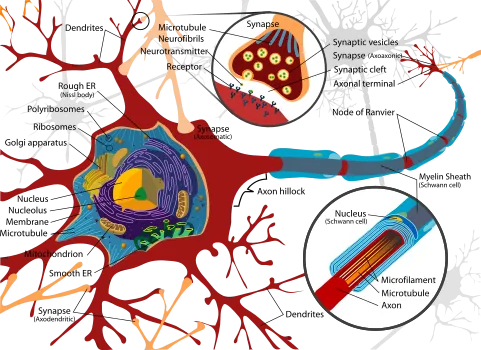
Wikipedia: Structure of a myelinated vertebrate motorneuron
With the help of studies by Karl Lashley and Wilder Penfield;
It is also important to state that memories are not stored in just one part of the brain but are widely distribute through out the cortex, after consolidation memories are stored as groups of neurons that are primed to fire together in the same way the original memory was saved.
Its like trying to open a folder from a computer.., you follow a path to locate the folder, the same path in which it was saved.
WHY THEN DO WE FORGET MEMORIES
There are ongoing arguments that the brain doesn't actually forget, rather we just have a problem with the recall and retrieval process. Its like looking for a book in the library, you know its there but you don't know exactly where or how to get it.
According to Elizabeth Loftus, a cognitive psychologist and expert on human memory, she gave 4 reason why we actually forget things..,
1. RETRIEVAL FAILURE: That feeling that seem like a piece of information has just vanished from your memory or you even start to believe if you think hard enough you would be able to remember, why is this? Why are we not able to retrieve information from memory even though we know it’s there?
One possible explanation of this retrieval failure is the DECAY THEORY;
According to this theory, a memory trace is created every time a new theory is formed, it suggests that over time these memory traces begin to fade and disappear if the information is not retrieved and rehearsed, in other words if they are not consolidated.
One criticism of this theory is that research has shown that even memories which have not been rehearsed can still be stable in long term memory.
2. INTERFERENCE: This reason stem from the believe that memories compete and interfere with each other. And interference is more likely to occur when this memories and information stored are very similar to each other.
There are two types of interference;
Proactive interference; when an old memory makes it difficult or impossible to remember a new memory
Retro-active Interference: when new information interferes with the ability to remember an information previously stored
3. FAILURE TO STORE: Truth is our brain somehow deliberately does not store everything it processes, unless you are some kind of super power, the brain only stores things that are necessary for our everyday activity.
So sometimes our inability to remember things is because it wasn't stored in the long term memory in the first place.
4. MOTIVATED FORGETTING: Most times we may be motivated to want to forget our own memories for one reason or another usually due to painful and/or traumatic events.
Motivated forgetting can happen in two ways..,
Suppression: Conscious forgetting(deliberately and actively trying to forget)
Reppression: Unconscious form of forgetting
WHAT HAPPENS WHEN OUR MEMORIES BEGIN TO FADE
As we grow old, even as early as 20 years (sorry to scare you) the neurons in our brains begin to get weak and lose their connection until they start to die off.
This causes the brain to shrink and with this shrinking comes memory loss or faded memories. That's why sometimes we often have slip of memories.
The hippocampus, a part of the brain crucial for memory and learning becomes a part of the brain highly affected by its shrinking.
Also as the brain age, the synaptic connections starts to decline and with fewer connections comes slower cognitive processing.
In addition, our neuro-transmitter systems generates less chemical messengers with aging and the resulting decrease in dopamine, acetylcholine, serotonine, and norepinephrine causes us to lose memory.
SOME DISEASES ASSOCIATED WITH MEMORY LOSS
1. ALZHEIMER'S DISEASE: A brain disorder that causes dementia, resulting in memory loss and confusion. symptoms include, loss of abstract thinking, disorientation, and language problems.
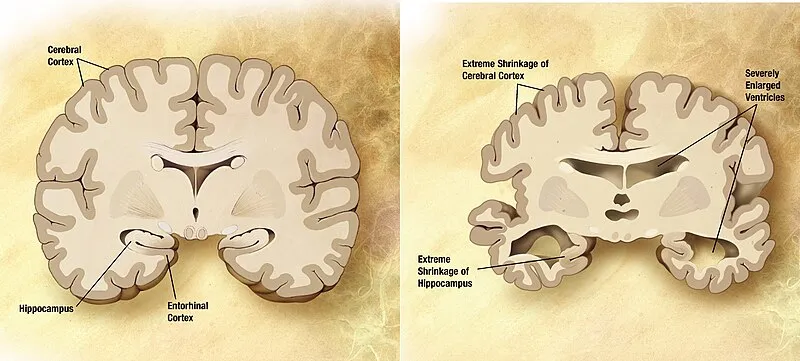
Wikimedia Commons: A normal brain vs A brain with Alzheimer's Disease
2. VASCULAR DEMENTIA: Its a common kind of disorder among old adults. It causes a subtle progressive decline of memory and other functions of the brain and this is a result of the reduction of blood flow to the brain.
3. MILD COGNITIVE IMPAIRMENT: This is a sharp decline in short term memory. Your critical thinking and reasoning skills might still be intact but yet experience short term memory loss.
You might have issues remembering a name you've just been told, the flow of a conversation, always misplacing things, etc.
Trying to understand the brain is like trying to get to the edge of the universe, something you and i know is absolutely not possible. And it seems i have an affinity for phenomenons that are still beyond the scope of what science can fully grasp and understand.
REFERENCES
1. Memory Disorders
2. Effect of Aging on the Brain
3. Structure of a neuron
4. The Human Memory
5. Memory
